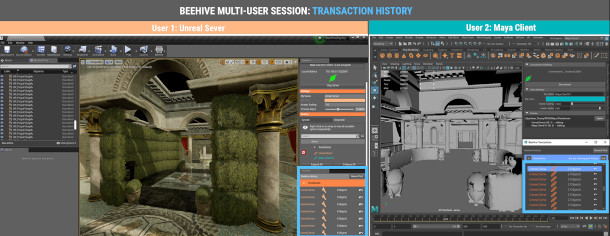Glassbox Technologies releases BeeHive
Glassbox Technologies has released BeeHive, its new collaboration tool for virtual production, enabling distributed teams to perform scene review and editing sessions in real time.
The plugin integrates with Maya, Unreal Engine and Unity.
A cross-site, cross-software real-time collaboration system for virtual production and VR
First released in beta last year alongside its sister tool, virtual camera system DragonFly, BeeHive is a “real-time collaboration, sync and review solution for virtual production”.
The software, which runs as a plugin within its host applications, enables teams to collaborate remotely.
Once one user makes a change to a scene – adding or manipulating assets, or editing lighting or camera positions – the changes are displayed inside the host software of the other users in real time.

Faster and more flexible than native collaboration tools
Although Unreal Engine and Unity already have Maya live link plugins, and Unreal Engine has its own collaborative editing system, Glassbox pitches BeeHive as a more flexible, streamlined solution.
As well as enabling Unity and Unreal Engine users to collaborate in the same review session, BeeHive handles timecode externally, which Glassbox says results in less latency than UE4’s native tick-based system.
Another selling point is BeeHive’s non-destructive real-time versioning system, based on a C++ database, which makes it possible for users to roll back changes to a scene to earlier states.
Although Glassbox says that it is “not trying to replace Perforce”, it points out that on set, “you don’t have time to check things in and out of [external version-control systems]”.
Not just for large studios
Studios currently using or trialling BeeHive include large visual effects and production facilities like The Mill, Luma Pictures and Technicolor.
Suggested use cases range from live virtual production to previs and postvis, and VR production.
However, Glassbox says that the software is also being used by teams of “three to seven people” producing YouTube and TikTok videos.
“It’s for people who don’t have the budget to do The Lion King or The Jungle Book,” Glassbox co-founder Mariana Acuña told CG Channel.
Product roadmap: USD support, better support for Maya materials
Changes planned for future updates to BeeHive include support for a wider range of Maya materials: currently, some objects display flat-shaded, making the system better suited for layout than look dev work.
Other planned changes include support for USD, increasingly used as the central scene-exchange format in VFX pipelines, as well as the software’s native ASCII format.
Glassbox says that support for other game engines, such as Lumberyard or 3ds Max Interactive, is possible, although it notes that studios can already create their own custom integrations using the BeeHive SDK.
Pricing and system requirements
BeeHive is compatible with Maya, Unity and Unreal Engine.
Annual rentals start at $5,300/year for five floating user licences. Although the prices aren’t listed on Glassbox Technologies website, perpetual licences start at $9,500 for teams of five.
